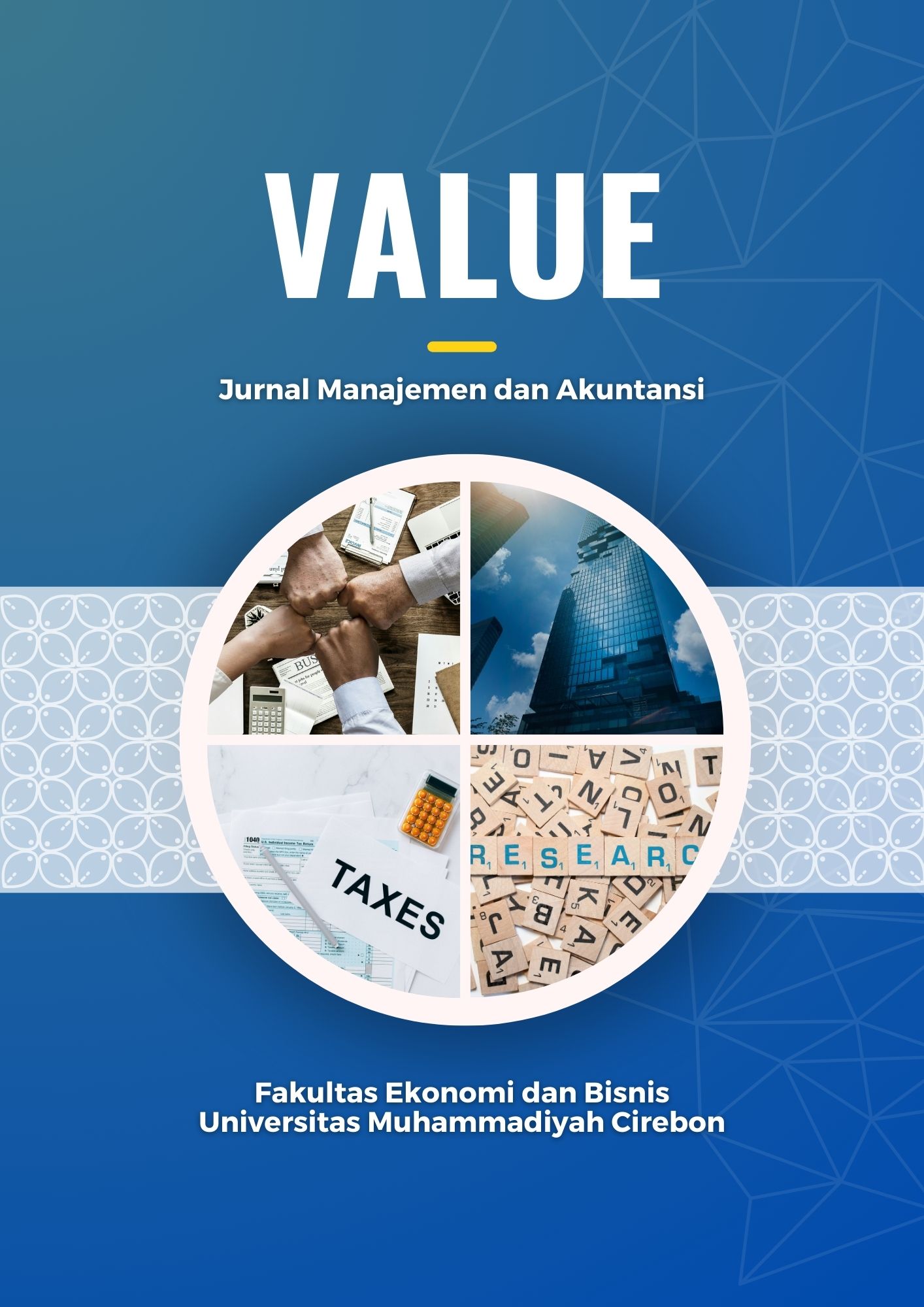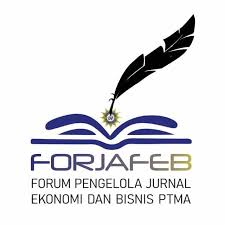Investigasi Peran Kompleksitas Tugas Subjektif dan Kapasitas Menyerap pada Perilaku Berbagi Pengetahuan
DOI:
https://doi.org/10.32534/jv.v20i1.6685Keywords:
Kompleksitas Tugas, Kapasitas Menyerap Potensial, Kapasitas Menyerap yang terealisasi Berbagi Pengetahuan, Persepsi IndividuAbstract
Berbagi pengetahuan merupakan proses yang sangat penting bagi individu, kelompok dan organisasi untuk memperoleh dan transfer informasi, ide dan pengalaman. Individu, kelompok dan organisasi diharapkan dapat memfasilitasi dan mengelola perilaku berbagi pengetahuan untuk mencapai visi dan misi. Penelitian ini bertujuan untuk menguji peran kompleksitas tugas secara subjektif dan kapasitas menyerap individu dalam berbagi pengetahuan di dalam organisasi. Penelitian mengambil sampel dengan teknik purposive dan diperoleh 197 responden. Tahapan pengujian yang dilakukan adalah uji instrumen, uji model, dan uji hipotesis. Hasil pengujian diperoleh bahwa kompleksitas tugas dan kapasitas menyerap (potential dan realized) yang tinggi akan menstimulus individu untuk melakukan perilaku praktik berbagi pengetahuan. Hal tersebut memberikan pandangan empiris bahwa kompleksitas tugas yang bersifat subjektif mampu mendorong individu untuk melakukan praktik berbagi pengetahuan. Hal yang sama juga terjadi pada kedua dimensi dari kapasitas menyerap. Semakin tinggi potential dan realized kapasitas menyerap individu akan mendorong individu untuk berbagi pengetahuan.
References
Ali, H. E., Schalk, R., van Engen, M., & van Assen, M. (2018). Leadership self?efficacy and effectiveness: The moderating influence of task complexity. Journal of Leadership Studies, 11(4), 21–40. https://doi.org/10.1002/jls.21550
Ali, I., Musawir, A.U. and Ali, M. (2018), "Impact of knowledge sharing and absorptive capacity on project performance: the moderating role of social processes", Journal of Knowledge Management, Vol. 22 No. 2, pp. 453-477. https://doi.org/10.1108/JKM-10-2016-0449
Bibi, S., & Ali, A. (2017). Knowledge Sharing Behavior of Academics in Higher Education. Journal of Applied Research in Higher Education, 9(4), 550–564. https://doi.org/https://doi.org/10.1108/JARHE-11-2016-0077
Chae, S., Seo, Y., & Lee, K. C. (2015). Effects of task complexity on individual creativity through knowledge interaction: A comparison of temporary and permanent teams. Computers in Human Behavior, 42, 138–148. https://doi.org/10.1016/j.chb.2013.10.015
Cohen, W. M., & Levinthal, D. A. (1990). Absorptive Capacity : A New Perspective on Learning and Innovation. Administrative Science Quarterly, 35(1), 128–152.
Dalkir, K. (2017). Knowledge Management in Theory and Practice. In Knowledge Management in Theory and Practice (Third). The MIT Press. https://doi.org/10.4324/9780080547367
Debusscher, J., Hofmans, J., & De Fruyt, F. (2017). Core self-evaluations as a moderator of the relationship between task complexity, job resources, and performance. European Journal of Work and Organizational Psychology, 26(3), 411–420. https://doi.org/10.1080/1359432X.2016.1277706
Engelman, R. M., Fracasso, E. M., Schmidt, S., & Zen, A. C. (2017). Intellectual Capital, Absorptive Capacity and Product Innovation. Management Decision, 55(3), 474–490. https://doi.org/https://doi.org/10.1108/MD-05-2016-0315
Flatten, T., Adams, D., & Brettel, M. (2015). Fostering absorptive capacity through leadership: A cross-cultural analysis. Journal of World Business, 50(3), 519–534. https://doi.org/10.1016/j.jwb.2014.08.010
Hadi, N. U., & Chaudhary, A. (2021). Impact of shared leadership on team performance through team reflexivity: examining the moderating role of task complexity. Team Performance Management, 27(5–6), 391–405. https://doi.org/10.1108/TPM-10-2020-0085
Haerem, T., Pentland, B. T., & Miller, K. (2015). Task Complexity: Extending a Core Concept. Academy of Management Review, 40(3), 446–460. https://doi.org/https://doi.org/10.5465/amr.2013.0350
Hair, J. F., Black, W. C., Babin, B. J., Anderson, R. E., Black, W. C., & Anderson, R. E. (2019). Multivariate Data Analysis (8th Editio). Cengage Learning.
Hsu, I. C., & Lawler, J. J. (2019). An investigation of the relationship between gender composition and organizational performance in Taiwan—The role of task complexity. Asia Pacific Journal of Management, 36(1), 275–304. https://doi.org/10.1007/s10490-018-9570-3
Jiang, Z., & Hu, X. (2016). Knowledge Sharing and Life Satisfaction: The Roles of Colleague Relationships and Gender. Social Indicators Research, 126(1), 379–394. https://doi.org/10.1007/s11205-015-0886-9
Jiménez-Barrionuevo, M. M., García-Morales, V. J., & Molina, L. M. (2011). Validation of an instrument to measure absorptive capacity. Technovation, 31(5), 190–202. https://doi.org/10.1016/j.technovation.2010.12.002
Kang, M., & Lee, M. J. (2017). Absorptive capacity, knowledge sharing, and innovative behaviour of R&D employees. Technology Analysis and Strategic Management, 29(2), 219–232. https://doi.org/10.1080/09537325.2016.1211265
Lantz Friedrich, A., Sjöberg, A., & Friedrich, P. (2016a). Leaned teamwork fattens workplace innovation: the relationship between task complexity, team learning and team proactivity. European Journal of Work and Organizational Psychology, 25(4), 561–569. https://doi.org/10.1080/1359432X.2016.1183649
Lantz Friedrich, A., Sjöberg, A., & Friedrich, P. (2016b). Leaned teamwork fattens workplace innovation: the relationship between task complexity, team learning and team proactivity. European Journal of Work and Organizational Psychology, 25(4), 561–569. https://doi.org/10.1080/1359432X.2016.1183649
Lee, G. (2022). Matching Task Complexity With Supplier Management to Enhance Outsourcing Performance. SAGE Open, 12(3). https://doi.org/10.1177/21582440221123460
Limaj, E., & Bernroider, E. W. . (2019). The roles of absorptive capacity and cultural balance for exploratory and exploitative innovation in SMEs. Journal of Business Research, Vol. 94, 137–153. https://doi.org/https://doi.org/10.1016/j.jbusres.2017.10.052
Lita, R. P., Faisal, R. F., & Meuthia, M. (2020). Enhancing small and medium enterprises performance through innovation in Indonesia: A framework for creative industries supporting tourism. Journal of Hospitality and Tourism Technology, 11(1), 155–176. https://doi.org/10.1108/JHTT-11-2017-0124
Liu, M. L., Lin, C. P., Joe, S. W., & Chen, K. J. (2019). Modeling knowledge sharing and team performance: The interactions of ethical leadership and ambidexterity with politics and job complexity. Management Decision, 57(7), 1472–1495. https://doi.org/10.1108/MD-01-2017-0052
Lowik, S., Kraaijenbrink, J., & Groen, A. (2017). Antecedents and effects of individual absorptive capacity: A micro-foundational perspective on open innovation. Journal of Knowledge Management, 21(6), 1319–1341. https://doi.org/10.1108/JKM-09-2016-0410
March, J. G. (1991a). Exploration and exploitation in organizational learning. Organization Science, 2(1), 71–87.
March, J. G. (1991b). Exploration and Exploitation in Organizational Learning. Organization Science, 2(1), 71–87. https://doi.org/10.1287/orsc.2.1.71
Maynard, D. C., & Hakel, M. D. (1997). Effects of Objective and Subjective Task Complexity on Performance Effects of Objective and Subjective Task Complexity on Performance. Human Performance, 10(4), 303–330. https://doi.org/https://doi.org/10.1207/s15327043hup1004_1
Müller, E., Pintor, S., & Wegge, J. (2018). Shared leadership effectiveness: perceived task complexity as moderator. Team Performance Management, 24(5–6), 298–315. https://doi.org/10.1108/TPM-09-2017-0048
Prange, C. (1999). Organizational Learning. Desperately Seeking Theory? In Organizational learning and the learning organization: Developments in theory and practice (pp. 24–43). SAGE Publication Ltd.
Ractham, V. V., & Chirawattanakij, S. (2016). How to uncover virtual earplugs for knowledge sharing. International Journal of Information Science and Management, 14(1), 57–72.
Schweisfurth, T. G., & Raasch, C. (2018). Absorptive capacity for need knowledge: Antecedents and effects for employee innovativeness. Research Policy, 47(4), 687–699. https://doi.org/10.1016/j.respol.2018.01.017
Shi, W., & Weber, M. S. (2018). Rethinking the complexity of virtual work and knowledge sharing. Journal of the Association for Information Science and Technology, 69(11), 1318–1329. https://doi.org/10.1002/asi.24055
Shwartz-Asher, D., Chun, S. A., Adam, N. R., & Snider, K. L. (2020). Knowledge sharing behaviors in social media. Technology in Society, 63, 101426. https://doi.org/10.1016/j.techsoc.2020.101426
Sia, S. K., & Appu, A. V. (2015). Work Autonomy and Workplace Creativity: Moderating Role of Task Complexity. Global Business Review, 16(5), 772–784. https://doi.org/10.1177/0972150915591435
Song, M., Yang, M. X., Zeng, K. J., & Feng, W. (2020). Green Knowledge Sharing, Stakeholder Pressure, Absorptive Capacity and Green Innovation: Evidence from Chinese Manufacturing Firms. Business Strategy and The Environmenthe Environment, 29(3), 1517–1531. https://doi.org/10.1002/bse.2450
Tian, A. W., & Soo, C. (2018). Enriching Individual Absorptive Capacity. Personnel Review, 47(5), 1116–1132. https://doi.org/https://doi.org/10.1108/PR-04-2017-0110
Valentim, L., Lisboa, J. V., & Franco, M. (2015). Knowledge management practices and absorptive capacity in small and medium-sized enterprises: is there really a linkage? R&D Management, 46(4), 711–725.
Valentim, L., Lisboa, J. V., & Franco, M. (2016). Knowledge management practices and absorptive capacity in small and medium-sized enterprises: is there really a linkage? R and D Management, 46(4), 711–725. https://doi.org/10.1111/radm.12108
Xie, X., Zou, H., & Qi, G. (2018). Knowledge absorptive capacity and innovation performance in high-tech companies: A multi-mediating analysis. Journal of Business Research, 88(June 2017), 289–297. https://doi.org/10.1016/j.jbusres.2018.01.019
Yao, F. K., & Chang, S. (2017). Do individual Employees’ Learning Goal Orientation and Civic Virtue Matter? A Micro?Foundations Perspective on Firm Absorptive Capacity. Strategic Management Journal, 28(10), 2041–2060. https://doi.org/10.1002/j
Yi, J. (2009). A measure of knowledge sharing behavior : scale development and validation. Knowledge Management Research and Practice, 7, 65–81. https://doi.org/10.1057/kmrp.2008.36
Zahra, S. A., & George, G. (2002). Absorptive Capacity : A Review Reconceptualization and Extension. Academy of Management Review, 27(2), 185–203. https://doi.org/https://doi.org/10.2307/4134351


















